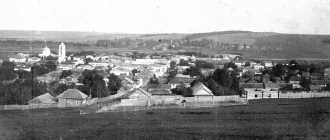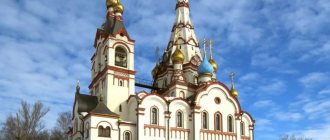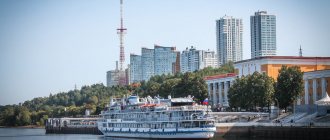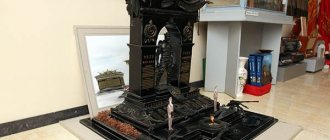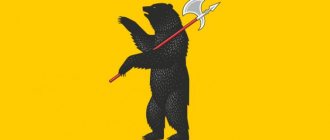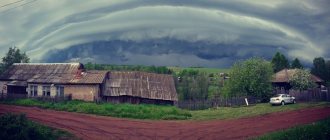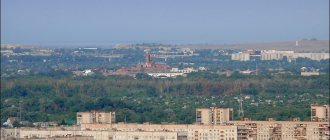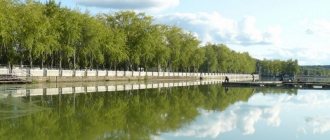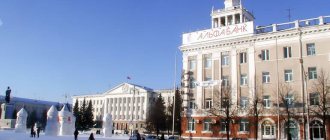Menzelinsk
The city was founded in 1584–1586. Prince Odoevsky as a Russian fortress (ostrog) on the site of settlements from the period of Volga Bulgaria, the Golden Horde and the Kazan Khanate. The initial population consisted of 100 mounted streltsy (white-arable Cossacks).
The first fort included 5 towers, 4 of which were blind, 1 was passable. In the middle of the 17th century. The fort expanded significantly and turned into the largest fortress on the Old Zakamskaya Line. In 1655, its garrison was replenished with 124 families from among the Smolensk gentry.
Since 1719 it was under voivodeship rule. The main administrative institution was the administrative hut, headed by a governor, who was subordinate to the Ufa governor.
In 1735–1742 In Menzelinsk, there was an emergency governing body - the Commission of Bashkir Affairs, created by decree of Empress Anna Ioannovna, to suppress uprisings and develop measures to resolve the socio-economic situation. The Astrakhan and Kazan provinces were subordinate to the Commission.
In 1743, Menzelinsk was included in the Orenburg province. Trade routes passed through Menzelinsk; in the 17th century. – Great Moscow Road.
Due to its geographical location, in the second half of the 17th - first half of the 18th centuries. Menzelinsk often found itself at the center of Bashkir-Tatar uprisings and became a place of concentration of government troops. During the Peasant War of 1773–1775. It was repeatedly stormed by rebels, but survived.
On October 23, 1781, Menzelinsk acquired the status of a district town of the Ufa governorship. From 1796 in Orenburg, from 1865 in Ufa provinces.
In 1897, 7,552 people lived here (including 6,525 Russians, 488 Tatars, 374 Bashkirs). The main occupations of the residents during this period were trade, arable farming, and various crafts.
In 1786, the first school was opened in the city, in 1818 it was transformed into a district school and transferred to a three-year educational program, and since 1909 - a real school with a four-year program.
In 1839, a parish school was opened (under the jurisdiction of the St. Nicholas Cathedral, closed in 1918), from 1860 - a women's school (in 1896 it was named after Princess Olga), from 1866 - a women's gymnasium (with 1883 with a six-year training program; from 1902 it was located in a building built in 1882 by the landowner Gorbushin as a hotel for merchants who came to fairs), from 1875 - a men's gymnasium (operated until 1889), from 1889 g. - agricultural school (in 1910 transformed into an agricultural school), from 1918 - an agricultural polytechnic school, from 1919 - an agricultural technical school.
In 1807–1813 on the site of a dilapidated church of the 17th century. with funds collected by retired non-commissioned officer M.D. Sitnikov, the St. Nicholas Cathedral was erected (after the fire of 1878, it was renewed with funds from Elabuga merchants I.I. and D.I. Stakheevs, as well as I.G. Stakheev and Kazan merchant P.V. Shchetinkin). In 1938 the temple was closed, the bell tower was dismantled; the building was transferred to the agricultural technical school, then was used as a cinema hall, and since 1954 it housed the mill administration. In the 1990s. The temple was returned to believers and restored (an architectural monument in the classicist style).
In 1860, the Prophet Elias Convent was founded. At the beginning of the twentieth century. was one of the largest convents in the Ufa diocese; in 1917, 50 nuns and 248 novices lived in it. The monastic farm included an orchard, a vegetable garden, an apiary, an icon-painting, gold-embroidery, carpentry, tailoring, shoemaking and bookbinding workshops. In 1868, a women's parochial school was opened under him. In 1929 the monastery was closed; Part of the fence and some outbuildings have been preserved.
The monastery in the city owned three churches: the Church of Elijah the Prophet (built in 1799 on the cemetery), the Church of the Tikhvin Icon of the Mother of God (1865), and the Church of the Ascension of the Lord (1877).
In 1878, the Church of the Life-Giving Trinity was erected (in the eclectic style), in 1896 - the house church of the Archangel Michael at the prison castle (not active, partially preserved ) , the Church of the Icon of the Kazan Mother of God (since 1886, active). In 1932, most of the churches and the monastery were destroyed.
In 1910, the Cathedral Mosque was opened in the city center at the expense of the merchant M.S. Seitbattalov and parishioners. It belonged to the type of mosque with a minaret on the roof, the minaret has been lost; in the late 1990s – 2000s. restored; a monument of religious architecture in the “brick” style of eclecticism with a combination of national romanticism and pseudo-gothic motifs with a traditional space-planning solution.
At the beginning of the twentieth century. in Menzelinsk there was a women's gymnasium, a women's school (since 1860), a four-year secondary school, a parish school (since 1839), a women's school at the monastery, an agricultural school, a zemstvo hospital with 60 beds (since 1875), a zemstvo pharmacy , library, beer and mead brewery (since 1881), alcohol purification, molasses, match and brick factories.
Sports objects
- The Yubileiny sports complex (large and small swimming pools, bowling alley, gym) was built for the 225th anniversary of the city
- Sports complex "Yunost" (ice rink, tennis court, billiards, table tennis)
- Aeroclub "Menzelinsk" (parachute jumping)
- Sports complex "Olympus" (table tennis, tennis, football, volleyball, cross-country skiing, weight lifting)
World Championship 2010
From August 1 to August 5, 2010, the World Parachuting Championship was held at the Menzelinsk airfield.
Excerpt characterizing Menzelinsk
– Are you the commander of the cavalry regiment of Emperor Alexander? - asked Napoleon. “I commanded a squadron,” answered Repnin. “Your regiment honestly fulfilled its duty,” said Napoleon. “The praise of a great commander is the best reward for a soldier,” said Repnin. “I give it to you with pleasure,” said Napoleon. -Who is this young man next to you? Prince Repnin named Lieutenant Sukhtelen. Looking at him, Napoleon said, smiling: “II est venu bien jeune se frotter a nous.” [He came young to compete with us.] “Youth doesn’t stop you from being brave,” Sukhtelen said in a breaking voice. “Excellent answer,” said Napoleon. - Young man, you will go far! Prince Andrei, who, to complete the trophy of the captives, was also put forward, in full view of the emperor, could not help but attract his attention. Napoleon apparently remembered that he had seen him on the field and, addressing him, used the same name of the young man - jeune homme, under which Bolkonsky was reflected in his memory for the first time. – Et vous, jeune homme? Well, what about you, young man? - he turned to him, - how do you feel, mon brave? Despite the fact that five minutes before this, Prince Andrei could say a few words to the soldiers carrying him, he now, directly fixing his eyes on Napoleon, was silent... All the interests that occupied Napoleon seemed so insignificant to him at that moment, so petty seemed to him his hero himself, with this petty vanity and joy of victory, in comparison with that high, fair and kind sky that he saw and understood - that he could not answer him. And everything seemed so useless and insignificant in comparison with the strict and majestic structure of thought that was caused in him by the weakening of his strength from the bleeding, suffering and the imminent expectation of death. Looking into the eyes of Napoleon, Prince Andrei thought about the insignificance of greatness, about the insignificance of life, the meaning of which no one could understand, and about the even greater insignificance of death, the meaning of which no one living could understand and explain. The emperor, without waiting for an answer, turned away and, driving away, turned to one of the commanders: “Let them take care of these gentlemen and take them to my bivouac; let my doctor Larrey examine their wounds. Goodbye, Prince Repnin,” and he, moving his horse, galloped on. There was a radiance of self-satisfaction and happiness on his face. The soldiers who brought Prince Andrei and removed from him the golden icon they found, hung on his brother by Princess Marya, seeing the kindness with which the emperor treated the prisoners, hastened to return the icon. Prince Andrei did not see who put it on again or how, but on his chest, above his uniform, suddenly there was an icon on a small gold chain. “It would be good,” thought Prince Andrei, looking at this icon, which his sister hung on him with such feeling and reverence, “it would be good if everything were as clear and simple as it seems to Princess Marya. How nice it would be to know where to look for help in this life and what to expect after it, there, beyond the grave! How happy and calm I would be if I could now say: Lord, have mercy on me!... But to whom will I say this? Either the power is indefinite, incomprehensible, which I not only cannot address, but which I cannot express in words - the great all or nothing, - he said to himself, - or this is the God who is sewn up here, in this palm, Princess Marya? Nothing, nothing is true, except the insignificance of everything that is clear to me, and the greatness of something incomprehensible, but most important! The stretcher started moving. With each push he again felt unbearable pain; the feverish state intensified, and he began to become delirious. Those dreams of his father, wife, sister and future son and the tenderness that he experienced on the night before the battle, the figure of the small, insignificant Napoleon and the high sky above all this, formed the main basis of his feverish ideas. A quiet life and calm family happiness in Bald Mountains seemed to him. He was already enjoying this happiness when suddenly little Napoleon appeared with his indifferent, limited and happy look at the misfortune of others, and doubts and torment began, and only the sky promised peace. By morning, all the dreams mixed up and merged into the chaos and darkness of unconsciousness and oblivion, which, in the opinion of Larrey himself, Doctor Napoleon, were much more likely to be resolved by death than by recovery. “C’est un sujet nerveux et bilieux,” said Larrey, “il n’en rechappera pas.” [This is a nervous and bilious man, he will not recover.] Prince Andrei, among other hopeless wounded, was handed over to the care of the residents. At the beginning of 1806, Nikolai Rostov returned on vacation. Denisov was also going home to Voronezh, and Rostov persuaded him to go with him to Moscow and stay in their house. At the penultimate station, having met a comrade, Denisov drank three bottles of wine with him and, approaching Moscow, despite the potholes of the road, he did not wake up, lying at the bottom of the relay sleigh, near Rostov, which, as it approached Moscow, came more and more to impatience. “Is it soon? Soon? Oh, these unbearable streets, shops, rolls, lanterns, cab drivers!” thought Rostov, when they had already signed up for their holidays at the outpost and entered Moscow. - Denisov, we’ve arrived! Sleeping! - he said, leaning forward with his whole body, as if by this position he hoped to speed up the movement of the sleigh. Denisov did not respond. “Here is the corner of the intersection where Zakhar the cabman stands; Here he is Zakhar, and still the same horse. Here is the shop where they bought gingerbread. Soon? Well! - To which house? - asked the coachman. - Yes, over there at the end, how can you not see! This is our home,” said Rostov, “after all, this is our home!” Denisov! Denisov! We'll come now. Denisov raised his head, cleared his throat and did not answer. “Dmitry,” Rostov turned to the footman in the irradiation room. - After all, this is our fire? “That’s exactly how daddy’s office is lit up.” – Haven’t gone to bed yet? A? How do you think? “Don’t forget to get me a new Hungarian at once,” Rostov added, feeling the new mustache. “Come on, let’s go,” he shouted to the coachman. “Wake up, Vasya,” he turned to Denisov, who lowered his head again. - Come on, let's go, three rubles for vodka, let's go! - Rostov shouted when the sleigh was already three houses away from the entrance. It seemed to him that the horses were not moving. Finally the sleigh took to the right towards the entrance; Above his head, Rostov saw a familiar cornice with chipped plaster, a porch, a sidewalk pillar. He jumped out of the sleigh as he walked and ran into the hallway. The house also stood motionless, unwelcoming, as if it did not care about who came to it. There was no one in the hallway. "My God! is everything alright? thought Rostov, stopping for a minute with a sinking heart and immediately starting to run further along the entryway and familiar, crooked steps. The same door handle of the castle, for the uncleanness of which the countess was angry, also opened weakly. One tallow candle was burning in the hallway. Old man Mikhail was sleeping on the chest. Prokofy, the traveling footman, the one who was so strong that he could lift the carriage by the back, sat and knitted bast shoes from the edges. He looked at the opened door, and his indifferent, sleepy expression suddenly transformed into an enthusiastically frightened one. - Fathers, lights! Young Count! – he cried out, recognizing the young master. - What is this? My darling! - And Prokofy, shaking with excitement, rushed to the door to the living room, probably to make an announcement, but apparently changed his mind again, returned back and fell on the young master’s shoulder. -Are you healthy? - Rostov asked, pulling his hand away from him. - God bless! All glory to God! We just ate it now! Let me look at you, Your Excellency!
Notable natives
- Vinokurov, Boris Alekseevich - Hero of the Soviet Union;
- Vladimirov, Sergey Viktorovich - philologist, vice-rector of Perm University, head. regional council of the Perm regional executive committee.
- Galiev, Fakhrazi Galievich - Hero of the Soviet Union;
- Gordov, Vasily Nikolaevich - Hero of the Soviet Union;
- Konov, Vasily Anatolyevich - Russian sports journalist, commentator on Channel One (1998-2010), head of the sports news agency R-Sport (since 2010).
- Smirnova, Lidiya Nikolaevna - Soviet actress.
- Tapikov, Samuil Mikhailovich - Hero of the Soviet Union, single-handedly held off several hundred fascists for several hours, but was killed by a tank shell before reinforcements arrived;
- Tariko, Rustam Vasilievich - head of the Russian Standard holding;
- Tyomin, Viktor Antonovich, a famous photographer of World War II, photographed the historical moment of hoisting the flag of the Soviet Union over the Reichstag.
Links
Settlements on the Menzel
(from source to mouth)Peshev-Tamak | Saraily | Murtysh-Tamak | Sarmanovo | Azalakovo | Bolshoye Nurkeevo | Charliarema | Karashai-Saklovo | Kadryakovo | Naratly-Kichu | Menzelinsk Moscow (0—16)¹
Moscow region: Reutov (16) | Balashikha (16-30) | Old Kupavna (36—37) | Obukhovo (42—44) | Noginsk (50-60)
Vladimir region: Pokrov (103) | Cockerels (121) | Lakinsk (150) | Vladimir(180—192) | Vyazniki (291) | Gorokhovets (330)
Nizhny Novgorod region: Dzerzhinsk (384, 402) | Nizhny Novgorod
(414) | Kstovo (440) | Lyskovo (502)
Chuvashia: Cheboksary
(651) |
Kugesi
(660) | Tsivilsk (683)Tatarstan: Kazan
(820) |
Yelabuga | Naberezhnye Chelny (1055) | Menzelinsk
Bashkortostan: Verkhneyarkeyevo(1193) |
Durtyuli | Kushnarenkovo
|
Ufa
(1342)see further: M-5 "Ural"
¹ The number in brackets indicates the distance from the center of Moscow in kilometers: to the Nizhny Novgorod region - according to topographic maps, then - according to a GPS map.
